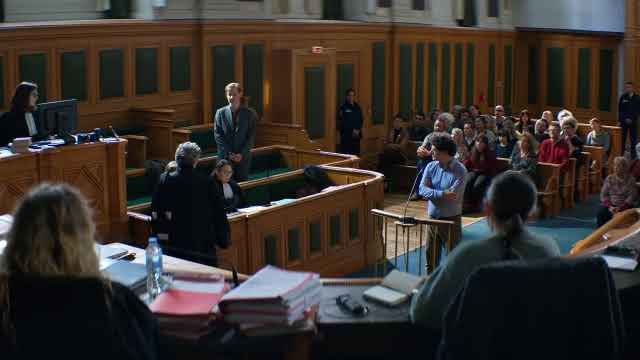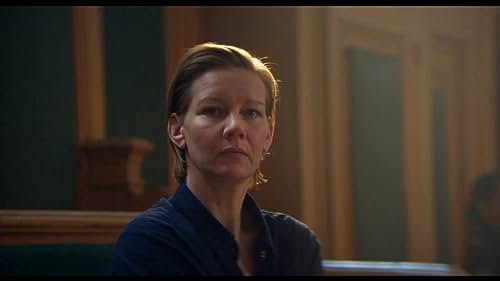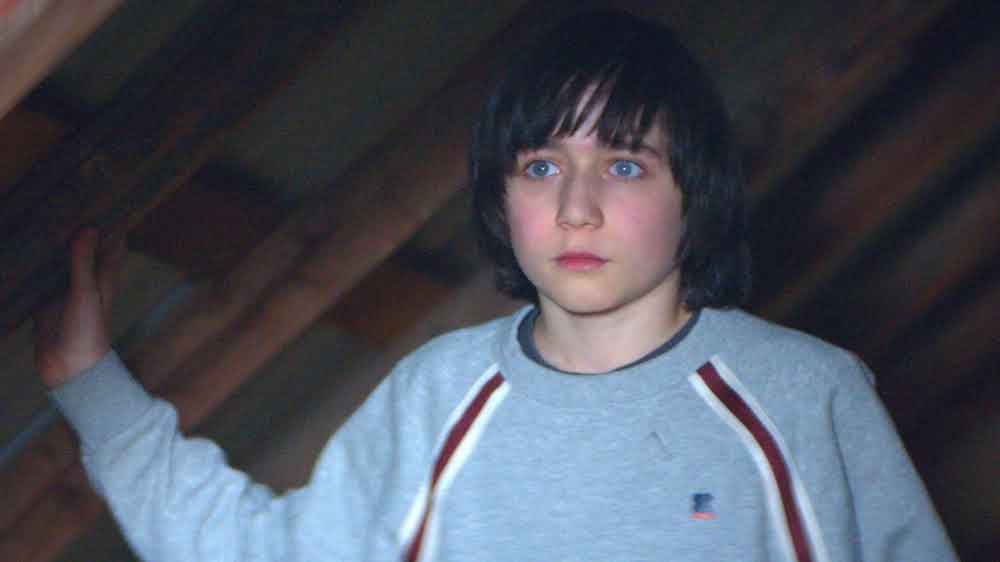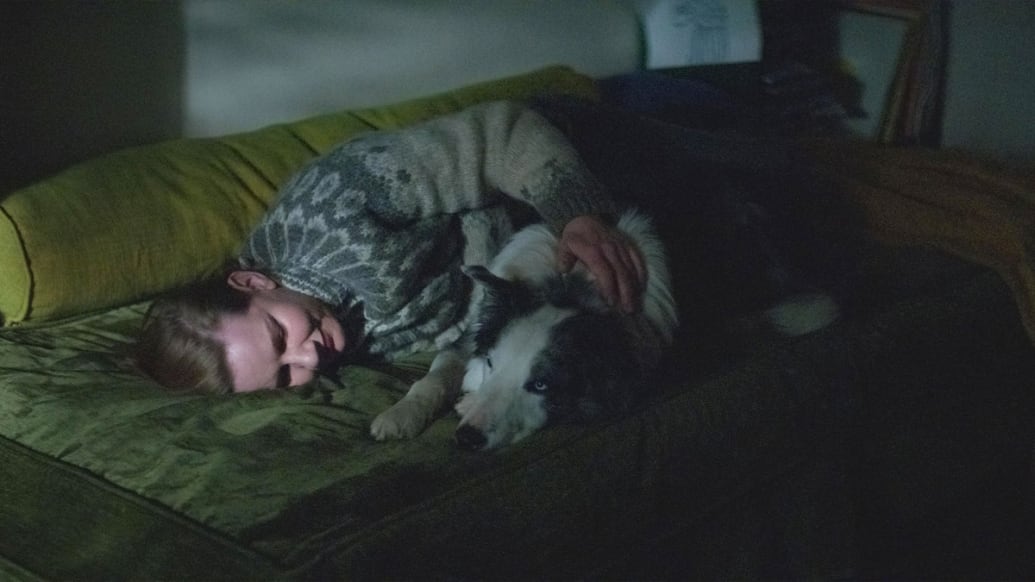A video went around a few years ago featuring a woman giving a wedding toast, who pretends to be setting up a sentimental moment between bride and groom. She tells them to look each other in the eyes, then reveals the punchline: “Just so you know, the person you’re looking at is statistically the most likely to murder you.” Gales of laughter ensue.
This gallows humour informs the themes of Anatomy of a Fall in two ways. For one, it acknowledges that marriage will be hard, and you may want to strangle your partner’s neck as often as massage it. More importantly from a legal standpoint, the difficulties inherent to this union make you the most likely suspect in the suspicious death of your partner, especially in the absence of any other suspects. Justine Triet’s recent best picture nominee, which also earned her a nomination as director, travels through all the complexities, possible contradictions and unassailable truths of this wedding toaster’s great joke, though it’s not a source of humour for any of the characters involved.
Sandra Voyter (Sandra Huller), a successful author, is the still-living spouse who becomes the primary suspect after the death of her husband, Samuel (Samuel Theis), an unsuccessful author plagued by writer’s block. The fact that she was the only one in the house when it happened means it isn’t just the natural presumption of guilt against a spouse that places her in legal hot water.
Her family – which also includes their visually impaired son Daniel (Milo Machado Graner) and their dog Snoop – has been spending a winter’s day at the French chalet they have recently called home. Sandra is in the midst of a recorded interview with a journalist when her unseen husband turns on loud music upstairs, the same steel drum song repeating on a loop. As this makes it impossible to continue the interview, Sandra tells the journalist she will catch up with her at a later date. Sandra appears more amused than angered by the incident, but what follows might indicate she was a lot more triggered and acted a lot more rashly.
When the boy returns from walking the dog, the two discover Samuel lying in the snow outside the chalet, bleeding from a fatal head wound. Sandra replies to her son’s cries and appears startled, immediately calling the police. The question then becomes, did Samuel fall from the top floor of the chalet, did he jump, or was he pushed?
Family friend and attorney Vincent Renzi (Swann Arlaud) discusses the details with Sandra and says, matter of factly, that she is the prime suspect, “Because you’re his wife.” She indignantly denies any validity to this presumption, but the facts don’t look good. Foul play from an intruder is disregarded as a realistic explanation, leaving suicide or an unlikely accident as the other options. Quickly the legal wheels begin turning, and a son grieving the loss of his father and the potential imprisonment of his mother emerges as a key witness – both to the mood that day and the tenor of their recent relationship. Complicating all the minute details of the case is that the German-born Sandra is not confident speaking French and possibly never wanted to live here in the first place. We the audience get English more than either language.
As you might expect from a French director, Triet is not very interested in providing definitive explanations for what happened in that house on that day. Of much greater interest, and of much more universal appeal to the audience, is the question of whether all the frustrations and stalemates of any marriage might lead a wife to push her husband out a window. At one point Sandra describes any relationship as “a chaos.” Could such a chaos prompt an unpremeditated moment of insanity, leading to the death of a spouse who’d been trolling his partner because he was jealous of her success? Is marriage that difficult?
As Anatomy of a Fall plays out, we are treated to snippets of their marriage, both as Sandra recalls them and in recreations of earlier scenes. Sandra is inconsistent with her memories and descriptions of what happened, both on the day and earlier in their relationship, which seems to point to her guilt. The film makes it clear, though, that our memories might be fallible and we may show signs of guilt even though we are innocent, because guilt can be born out of events leading up to a tragedy. Australians are well aware from the case of Lindy Chamberlain of the possible discrepancy between a person’s behaviour and their actual guilt. There’s a messy back story to this whole thing that only gradually reveals itself.
Anatomy of a Fall is first and foremost a court drama, and here it contains some of its juiciest and most clever details. In an astonishing performance for a child actor, Milo Machado Graner shows through his occluded eyes that he’s taking in all of this confronting testimony and trying to incorporate it into his understanding of his parents, with neither murder or suicide a palatable option, at the same time computing possible impacts to his own future. There’s a whole debate about whether he should be in his mother’s care when she might try to coach his testimony, so the court assigns an observer to constantly monitor their interactions, requiring that they only speak in French. It’s possible that if Daniel does intend to help his mother through fabricated testimony, he’ll have to entirely generate this content himself.
As with most everything that occurs in Anatomy of a Fall, whether that’s happening or not is ambiguous, allowing the film to prompt endless discussion and debate among viewers. The perfect embodiment of this ambiguity is Huller, star of Toni Erdmann, giving a performance that was also honoured with an Oscar nomination last week. Huller has naturally sympathetic qualities that she uses to good effect, but it’s also clear there’s something not quite right about Sandra the character, just under the surface, that makes the murder accusation credible. Then again, she could also be a person pushed past her limits by her husband’s microaggressions, others of which we see during flashbacks, as well as the circumstances that led to the blinding of her son. Sandra is inscrutable in engaging and compelling ways, and the fact that both she and her husband have the same name first names as the actors playing them just adds a level of intrigue to the whole project.
Anatomy of a Fall won the Palme d’Or at Cannes and is one of the best reviewed films of the year, but its conventional satisfactions are few and far between. This is a story told obliquely, in the margins. Its gradual accumulation of profundity should play terrifically for anyone who isn’t expecting a standard whodunnit with a Hollywood courtroom climax.
Anatomy of a Fall is currently playing in cinemas.




